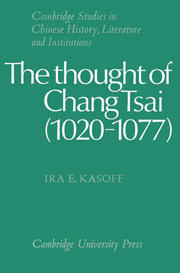Summary
Introduction
The sages – who they were and what they had done – were a long-standing concern in the Chinese philosophic tradition. Numerous philosophers and philosophic schools shared the view that the sages had raised mankind from the level of uncivilized creatures; that they had, in effect, created Chinese culture.
In the eleventh century a new element was added to the long-standing interest in sages, one which remained a major strand in Tao hsüeh thought for centuries thereafter. This new element was the notion that one should seek not only to follow the Way of the sages, but also to become a sage oneself. An interesting illustration of this point is found in Reflections on Things at Hand, the anthology compiled by Chu Hsi and Lü Tsu-ch'ien in the twèlfth century. This work ends with a comment by Chang Tsai on the Ch'eng brothers' determination to achieve sagehood. As one scholar has noted, the editors' intention was ‘…to leave as the final impression in the reader's mind the example of the Ch'eng brothers' active commitment to becoming sages.’
Pursuing an elusive goal
For Chang Tsai sagehood was the goal in the arduous process of learning. That process, as he described it, is carried out as follows: the learner first strives to change and transform his ch'i-constitution to get in touch with ‘this mind,’ his intuitive ability to understand the Way; he then sets himself firmly on this ‘spot,’ and ‘expands his mind’ by applying this intuitive sense to more and more phenomena and situations, until he comes to understand the ultimate unity of all things.
- Type
- Chapter
- Information
- The Thought of Chang Tsai (1020–1077) , pp. 104 - 124Publisher: Cambridge University PressPrint publication year: 1984

